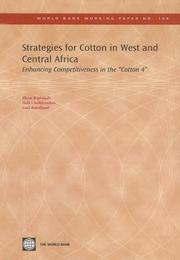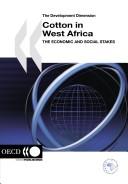| Listing 1 - 7 of 7 |
Sort by
|
Book
ISBN: 1484326229 Year: 2015 Publisher: Washington : International Monetary Fund,
Abstract | Keywords | Export | Availability | Bookmark
 Loading...
Loading...Choose an application
- Reference Manager
- EndNote
- RefWorks (Direct export to RefWorks)
KEY ISSUES Context. The region continued to experience strong growth in 2014, led by the continued economic expansion in Cote d'Ivoire. The outlook is for further strong growth, subject to a range of downward risks, in particular political instability ahead of upcoming elections in several countries, and security issues in Mali and Niger. With an elevated fiscal deficit exerting pressure on the balance of payments and the regional financial market, delays in fiscal consolidation or structural reforms pose the main medium-term risks. Policy recommendations: Fiscal consolidation. Safeguarding e
Book
ISBN: 9186702076 9789186702076 Year: 1990 Volume: 3 Publisher: Stockholm: Bethany Books,
Abstract | Keywords | Export | Availability | Bookmark
 Loading...
Loading...Choose an application
- Reference Manager
- EndNote
- RefWorks (Direct export to RefWorks)
International economic relations --- West Africa --- Developing countries --- Africa, West --- Economic conditions --- Economic policy --- Developing countries - Economic conditions --- Africa, West - Economic conditions - 1960 --- -Africa, West - Economic policy --- Developing countries - Economic policy

ISBN: 0821371312 9786610940318 128094031X 0821371320 Year: 2007 Publisher: Washington, D.C. : World Bank,
Abstract | Keywords | Export | Availability | Bookmark
 Loading...
Loading...Choose an application
- Reference Manager
- EndNote
- RefWorks (Direct export to RefWorks)
Based on comprehensive empirical studies, the paper identifies key reforms and defines strategies to enhance the competitiveness of the cotton sector in West and Central Africa. Lessons learned from the 1990's suggest that transferring public property to private enterprises is not enough, by itself, to put the sector back on a sustainable path. The cotton sector in most West and Central African countries is critical in terms of its contribution to GDP and exports as well as poverty reduction. Until recently, the cotton sector was characterized by a vertically integrated monopolistic structure,
Africa, West -- Economic conditions -- 1960-. --- Africa, West -- Economic policy. --- Cotton growing -- Africa, West. --- Cotton trade -- Africa, Central. --- Cotton trade -- Africa, West. --- Cotton trade -- Government policy -- Africa, West. --- Cotton trade. --- Cotton trade --- Business & Economics --- Industries --- Textile industry
Book
ISBN: 9782296545342 2296545343 Year: 2011 Publisher: Paris: L'Harmattan,
Abstract | Keywords | Export | Availability | Bookmark
 Loading...
Loading...Choose an application
- Reference Manager
- EndNote
- RefWorks (Direct export to RefWorks)
Depuis plus de cinquante années, la question du développement et de ses fondements épistémologiques et éthiques ne cesse d'occuper tous ceux qui portent à coeur le destin de l'Afrique. Charles Mbadu voudrait renouveler le débat avec un esprit critique et perspicace qu'on lui reconnaît. Son objectif : arriver à dégager les conditions de possibilité du développement par la philosophie, pas n'importe quelle philosophie, mais bien par une réflexion économique et politique portée par une éthique de la militance. Cette éthique émerge à partir de la situation socioéconomique de progression de la pauvreté et de la misère en Afrique, dans l'objectif de forcer tous les Etats du monde à pratiquer la justice vraie. Tant que les Etats les plus riches de la planète se montreront incapables d'oublier les intérêts de leurs Etats nationaux et ne prendront pas en compte les revendications égalitaires présentées par les Etats du Sud, le développement de l'humanité sera fortement compromis.
Political philosophy. Social philosophy --- Africa --- Economics --- Economic development --- Moral and ethical aspects --- History --- Africa, West --- Economic conditions --- Politics and government --- Philosophy --- Economics - Moral and ethical aspects - Africa, West --- Economic development - Moral and ethical aspects - Africa, West --- Economics - Africa, West - History --- Economic development - Africa, West --- Africa, West - Economic conditions - 1960 --- -Africa, West - Politics and government - Philosophy

ISBN: 1281737631 9786611737634 9264025065 9264025057 Year: 2006 Publisher: Paris : OECD,
Abstract | Keywords | Export | Availability | Bookmark
 Loading...
Loading...Choose an application
- Reference Manager
- EndNote
- RefWorks (Direct export to RefWorks)
In West Africa, approximately 16 million people depend directly or indirectly on cotton cultivation. Cotton plays a vital role in the economic and social development of many countries, and in improving the livelihoods of the inhabitants. It has also enabled West Africa to become a major player on the international market, since it is now the second largest fiber exporter behind the United States. This success is partly due to an integrated approach which is often called the "cotton system." Since the World Trade Organization's 2003 Ministerial Conference in Cancun, the actors in the international community have recognized the crucial need to address the cotton crisis in an "ambitious, rapid and specific" manner. At the end of the Hong Kong Ministerial Conference in December 2005, progress was made in the negotiations aiming to reduce subsidies, ensure market access and improve development policies. On 24 July, multilateral trade negotiations of the Doha "Development Round" were suspended because an agreement could not be reached which would satisfy both developing and developed countries. This book contends that dialogue between developed and developing countries should continue in order to find a lasting solution to the difficulties facing the cotton sub-sector. It sets out the regional stakes linked to the economic and social importance of cotton in West Africa. It retraces the consultation process on the West African cotton crisis with the aim of finding a negotiated solution acceptable to all parties. Also discussed are the challenges and the measures that need to be taken over the medium and long term in order to prevent this sub-sector's sudden collapse. Countries covered: Benin, Burkina Faso, Cameroon, Cape Verde, Chad, Cote d'Ivoire, The Gambia, Ghana, Guinea, Guinea-Bissau, Liberia, Mali, Mauritania, Niger, Nigeria, Senegal, Sierra Leone, and Togo.--Publisher summary.
Africa, West -- Economic conditions -- 1960-. --- Africa, West -- Economic policy. --- Africa, West -- Social conditions -- 1960-. --- Cotton growing -- Africa, West. --- Cotton growing. --- Cotton textile industry -- Africa, West. --- Cotton textile industry. --- Cotton trade -- Africa, West. --- Cotton trade -- Government policy -- Africa, West. --- Cotton trade. --- Cotton trade --- Textile industry --- Business & Economics --- Industries --- Social aspects --- Economic aspects --- Textile industry and fabrics --- Textiles industry --- Manufacturing industries
Book
ISBN: 0821395378 9786613693396 0821395424 1280783001 Year: 2012 Publisher: Washington, D.C. : World Bank,
Abstract | Keywords | Export | Availability | Bookmark
 Loading...
Loading...Choose an application
- Reference Manager
- EndNote
- RefWorks (Direct export to RefWorks)
The informal sector in West Africa has some distinctive characteristics. Informality usually connotes small and unorganized producers operating on the fringes of the formal economy. In West African countries, however, the normal situation is to some extent reversed: a dynamic informal sector dominates the stagnant formal economy. Moreover, in these countries, small operators coexist with very large and politically well-connected informal enterprises and well-organized networks. Notwithstanding its importance, there have been relatively few systematic studies of this dual feature of the informa
Africa, West -- Economic conditions -- 1960. --- Informal sector (Economics) -- Africa, French-speaking West. --- Small business -- Africa, French-speaking West. --- Informal sector (Economics) --- Small business --- Management --- Business & Economics --- Industrial Management --- Africa, West --- Economic conditions --- Businesses, Small --- Medium-sized business --- Micro-businesses --- Microbusinesses --- Microenterprises --- Small and medium-sized business --- Small and medium-sized enterprises --- Small businesses --- SMEs (Small business) --- Hidden economy --- Parallel economy --- Second economy --- Shadow economy --- Subterranean economy --- Underground economy --- Business --- Business enterprises --- Industries --- Artisans --- Economics --- Size
Book
ISBN: 1461412331 9786613934796 146141234X 1552505413 1283622343 9781552505410 9781283622349 9781461412342 Year: 2012 Publisher: New York, NY : Springer New York : Imprint: Springer,
Abstract | Keywords | Export | Availability | Bookmark
 Loading...
Loading...Choose an application
- Reference Manager
- EndNote
- RefWorks (Direct export to RefWorks)
L’intégration régionale comme premier pas vers l’accès au marché mondial? Dans un contexte où la libéralisation du commerce n'a pas entraîné les gains escomptés par les pays sous-développés et où la croissance du commerce mondial ne s’est pas accompagnée d’une croissance économique équivalente, une solution alternative a émergée. Un nouveau paradigme a fait valoir que la libéralisation des échanges devait s’accompagner d’investissements publics. Cela dit, la nature même de la libéralisation du commerce entraîne une diminution des ressources nécessaires aux investissements publics. Sur la base d’arguments solides, les pays sous-développés sont donc actuellement encouragés à mettre d’abord l’accent sur l'intégration régionale avant de rechercher l’accès au marché mondial. Cet ouvrage, qui aborde les questions liées à l’intégration régionale en Afrique de l’ouest, présente des données empiriques sur les efforts entrepris par les pays de l'Union économique et monétaire ouest-africaine (UEMOA) pour la convergence de leurs économies. Il examine également comment ces efforts, qui représentent un élément important pour l’intégration régionale, influent sur la réduction de la pauvreté dans les pays de l’UEMOA. Il intéressera par conséquent tous les chercheurs qui travaillent sur ce thème.
Africa, West -- Economic conditions -- 1960. --- Economic development -- Africa, West. --- Economics. --- Business & Economics --- Economic History --- Economic Theory --- Monetary unions --- Africa, West --- Economic integration. --- Economic development --- Development, Economic --- Economic growth --- Growth, Economic --- Economic policy. --- Development economics. --- Economic growth. --- Development Economics. --- Economic Growth. --- Economic Policy. --- Economic policy --- Economics --- Statics and dynamics (Social sciences) --- Development economics --- Resource curse --- Economic nationalism --- Economic planning --- National planning --- State planning --- Planning --- National security --- Social policy --- Common currencies --- Currency areas --- Currency unions --- Optimum currency areas --- Currency question --- Money --- Développement économique --- Afrique occidentale --- Conditions économiques --- Economic conditions --- Economic development.
| Listing 1 - 7 of 7 |
Sort by
|

 Search
Search Feedback
Feedback About UniCat
About UniCat  Help
Help News
News